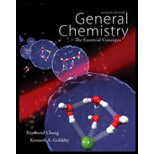
Concept explainers
(a)
Interpretation:
The strength of the given strong acid
Concept Information:
pH definition:
The concentration of hydrogen ion is measured using
The
Strong acids:
In strong acids, the ionization of acid is complete. This implies that the concentration of the hydrogen ion or hydronium ion will be equal to the initial concentration of the acid at equilibrium.
Weak acids:
In weak acids, the ionization of acid is not complete. This implies that the concentration of the hydrogen ion or hydronium ion will not be equal to the initial concentration of the acid at equilibrium.
For strong acids the concentration of acid will be same as that of the concentration of hydrogen ions, because strong acids undergo complete ionization.
In case of weak acid, the concentration of hydrogen ion will be less than the concentration of given acid; since weak acid does not ionize completely.
(b)
Interpretation:
The strength of the given strong acid
Concept Information:
Electrical conductance: When voltage is applied to the electrode dipped into an electrical solution, ion of the electrolyte move and
Strong acids:
In strong acids, the ionization of acid is complete. This implies that the concentration of the hydrogen ion or hydronium ion will be equal to the initial concentration of the acid at equilibrium.
Weak acids:
In weak acids, the ionization of acid is not complete. This implies that the concentration of the hydrogen ion or hydronium ion will not be equal to the initial concentration of the acid at equilibrium.
For strong acids the concentration of acid will be same as that of the concentration of hydrogen ions, because strong acids undergo complete ionization.
In case of weak acid, the concentration of hydrogen ion will be less than the concentration of given acid; since weak acid does not ionize completely.
(c)
Interpretation:
The strength of the given strong acid
Concept Information:
Strong acids:
In strong acids, the ionization of acid is complete. This implies that the concentration of the hydrogen ion or hydronium ion will be equal to the initial concentration of the acid at equilibrium.
Weak acids:
In weak acids, the ionization of acid is not complete. This implies that the concentration of the hydrogen ion or hydronium ion will not be equal to the initial concentration of the acid at equilibrium.
For strong acids the concentration of acid will be same as that of the concentration of hydrogen ions, because strong acids undergo complete ionization.
In case of weak acid, the concentration of hydrogen ion will be less than the concentration of given acid; since weak acid does not ionize completely.
Want to see the full answer?
Check out a sample textbook solution
Chapter 16 Solutions
General Chemistry
 ChemistryChemistryISBN:9781305957404Author:Steven S. Zumdahl, Susan A. Zumdahl, Donald J. DeCostePublisher:Cengage Learning
ChemistryChemistryISBN:9781305957404Author:Steven S. Zumdahl, Susan A. Zumdahl, Donald J. DeCostePublisher:Cengage Learning ChemistryChemistryISBN:9781259911156Author:Raymond Chang Dr., Jason Overby ProfessorPublisher:McGraw-Hill Education
ChemistryChemistryISBN:9781259911156Author:Raymond Chang Dr., Jason Overby ProfessorPublisher:McGraw-Hill Education Principles of Instrumental AnalysisChemistryISBN:9781305577213Author:Douglas A. Skoog, F. James Holler, Stanley R. CrouchPublisher:Cengage Learning
Principles of Instrumental AnalysisChemistryISBN:9781305577213Author:Douglas A. Skoog, F. James Holler, Stanley R. CrouchPublisher:Cengage Learning Organic ChemistryChemistryISBN:9780078021558Author:Janice Gorzynski Smith Dr.Publisher:McGraw-Hill Education
Organic ChemistryChemistryISBN:9780078021558Author:Janice Gorzynski Smith Dr.Publisher:McGraw-Hill Education Chemistry: Principles and ReactionsChemistryISBN:9781305079373Author:William L. Masterton, Cecile N. HurleyPublisher:Cengage Learning
Chemistry: Principles and ReactionsChemistryISBN:9781305079373Author:William L. Masterton, Cecile N. HurleyPublisher:Cengage Learning Elementary Principles of Chemical Processes, Bind...ChemistryISBN:9781118431221Author:Richard M. Felder, Ronald W. Rousseau, Lisa G. BullardPublisher:WILEY
Elementary Principles of Chemical Processes, Bind...ChemistryISBN:9781118431221Author:Richard M. Felder, Ronald W. Rousseau, Lisa G. BullardPublisher:WILEY





